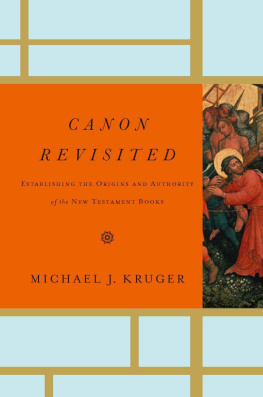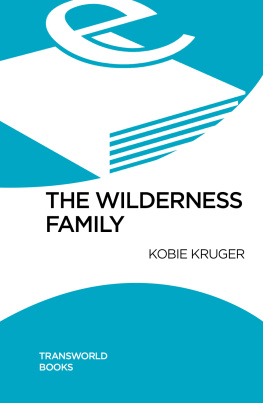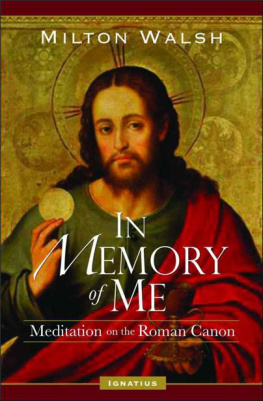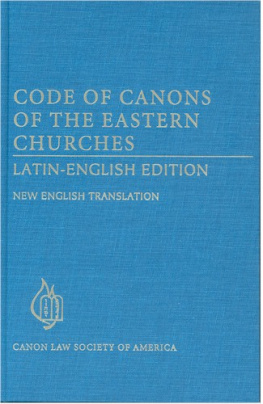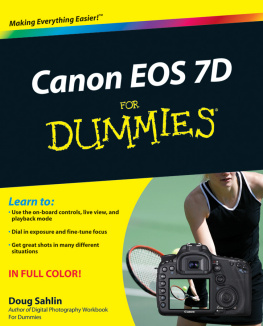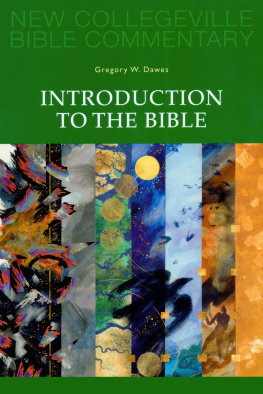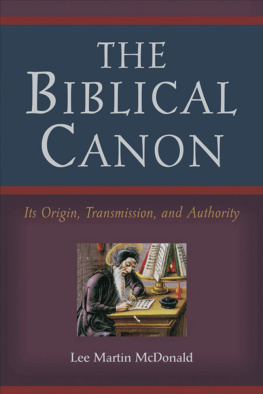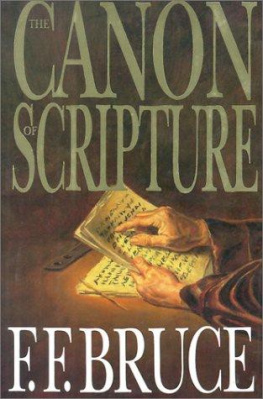This book fills a lacuna in evangelical scholarship. Rarely does academic specialization in canon studies converge with thorough commitment to biblical authority. In this work, close evaluation of the history of approaches to the canon is matched by a richly theological interpretation of what it means to call Scripture our canon. Careful, accessible, and wise in his explorations, Michael Kruger has given us a gift that will keep on giving for generations to come.
Michael S. Horton, J. Gresham Machen Professor of Systematic Theology and Apologetics, Westminster Seminary California
The Christian canon of Scripture is under fire now more than ever. Sadly, even as so much of this fire has been issuing from academic quarters, we are left with more smoke than light. Stepping into the gap with a fresh synthesis is Michael Krugers Canon Revisited . Gracefully uniting theology and history, Kruger invokes the chief Reformed argument for canon and gives it fresh wings.
Nicholas Perrin, Franklin S. Dyrness Professor of Biblical Studies, Wheaton College Graduate School
Of all the recent books and articles on the canon of Scripture, this is the one I recommend most. It deals with the critical literature thoroughly and effectively while presenting a cogent alternative grounded in the teaching of Scripture itself. Michael Kruger develops the historic Reformed model of Scripture as self-authenticating and integrates it with a balanced appreciation for the history of the canon and the role of the community in recognizing it. This is the definitive work on the subject for our time.
John M. Frame, J. D. Trimble Chair of Systematic Theology and Philosophy, Reformed Theological Seminary, Orlando, Florida
Michael Kruger has written the book on the canon of Scripture that has been much needed for a long time. His focus is not on the process, but on the vitally important question of how Christians can know that they have the right books in their canon of Scripture. The question is an excellent one and needs to be addressed honestly and competently. Kruger does just that. This excellent book goes a long way toward clearing up confusion and misguided theories. I highly recommend it.
Craig A. Evans, Payzant Distinguished Professor of New Testament, Acadia Divinity College and Acadia University
Here, finally, is what so many pastors, seminary professors, and students have long been waiting for: a clear, well-informed, and scripturally faithful answer to the question of how Christians should account for the New Testament canon. Perhaps not since Ridderboss Redemptive History and the New Testament Scriptures has there appeared such a valuable single source on the New Testament canon that is both historically responsible and theologically satisfying (and this book improves on Ridderbos in many ways). Michael Krugers work will help readers get a handle on what may seem like a myriad of current approaches to canon, whether ecclesiastical or critical. This book will foster clearer thinking on the subject of the New Testament canon and will be a much referenced guide for a long time to come.
Charles E. Hill, Professor of New Testament, Reformed Theological Seminary, Orlando, Florida
Michael Kruger has written an important and comprehensive treatment of the New Testament canon. As an advocate of the self-authenticating view, he goes to great lengths to argue his case, but he also delves deeply into the variety of historical and community-based positions. He provides an insightful treatment of epistemological grounds for belief, and debates the positions in a rigorous way not often found in such discussions. I am sure friend and foe alike will learn from this valuable volume.
Stanley E. Porter, President, Dean, and Professor of New Testament, McMaster Divinity College; author, Verbal Aspect in the Greek of the New Testament
Canon Revisited is a well-written, carefully documented, and helpful examination of the many historical approaches that have been written to explain when and how the books of the New Testament were canonized. The authors interest, however, is to move beyond the historical to the theological, concluding that the concepts of a self-authenticating canon and its corporate reception by the church are ultimately how we know that these twenty-seven books belong in the New Testament.
Arthur G. Patzia, Senior Professor of New Testament, Fuller Theological Seminary; author, The Making of the New Testament
CANON
REVISITED
Also by Michael J. Kruger
The Heresy of Orthodoxy: How Contemporary Cultures Fascination with Diversity Has Reshaped Our Understanding of Early Christianity , coauthored with Andreas J. Kstenberger

Canon Revisited: Establishing the Origins and Authority of the New Testament Books
Copyright 2012 by Michael J. Kruger
Published by Crossway |
1300 Crescent Street Wheaton, Illinois 60187 |
All rights reserved. No part of this publication may be reproduced, stored in a retrieval system, or transmitted in any form by any means, electronic, mechanical, photocopy, recording, or otherwise, without the prior permission of the publisher, except as provided for by USA copyright law.
Cover design: Studio Gearbox
Cover image(s): Photos.com
Interior design and typesetting: Lakeside Design Plus
First printing 2012
Printed in the United States of America
All English translations of the apostolic fathers, unless otherwise noted, are from Bart D. Ehrman, The Apostolic Fathers . 2 vols. Cambridge, MA: Harvard University Press, 2003.
Unless otherwise noted, English translations cited as Eusebius, Hist. eccl. are from Ecclesiastical History . Translated by Kirsopp Lake. Loeb Classical Library. Harvard: Harvard University Press, 1926.
English translations cited as Origen, Princ. are from On First Principles . Translated by G. W. Butterworth. Gloucester, MA: P. Smith, 1973.
English translations of other church fathers, unless otherwise indicated, are from The Ante-Nicene Fathers . Edited by Alexander Roberts and James Donaldson, vol. 1. 1885. Repr. Peabody, MA: Hendrickson, 1994.
Unless otherwise indicated, Scripture quotations are from the ESV Bible ( The Holy Bible, English Standard Version ), copyright 2001 by Crossway. Used by permission. All rights reserved.
All emphases in Scripture quotations have been added by the author.
Hardcover ISBN: 978-1-4335-0500-3
ePub ISBN: 978-1-4335-3081-4
PDF ISBN: 978-1-4335-3079-1
Mobipocket ISBN: 978-1-4335-3080-7
Library of Congress Cataloging-in-Publication Data
Kruger, Michael J.
Canon revisited : establishing the origins and authority of the New Testament books / Michael J. Kruger.p. cm.Includes bibliographical references and index.ISBN 978-1-4335-0500-3 (hc)1. Bible. N.T.Canon. I. Title.
| BS2320.K78 2012 |
| 225.1'2dc23 |
2011050116 |
Crossway is a publishing ministry of Good News Publishers.
| SH | 24 | 23 | 22 | 21 | 20 | 19 | 18 | 17 | 16 | 15 | 14 | 13 | 12 |
| 14 | 13 | 12 | 11 | 10 | 9 | 8 | 7 | 6 | 5 | 4 | 3 | 2 | 1 |
To my students
C ONTENTS
The most enjoyable books to write are those that answer questions you yourself have been asking. This is one of those books. For many years I have been fascinated with the origins of the New Testament and have devoted my research to the production and transmission of early Christian texts (both canonical and apocryphal). However, the core question I was asking never seemed to be addressed. I was interested not only in when and how these books were recognized as canonical, but also in how we know these books are canonical. My concerns were not only historical but also epistemological (and theological). Of course, I had a broad idea of how to address these epistemological issues, but my thinking needed more precision. After all, the canon is a complex topic with a seemingly endless number of loose ends that never seemed to get tied up. And the existing resources on canonregardless of how proficiently they answered the historical questionsnever quite seemed to scratch my epistemological and theological itch (at least not in a way that was satisfying).
Next page
